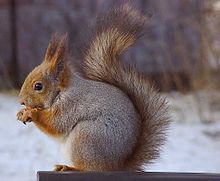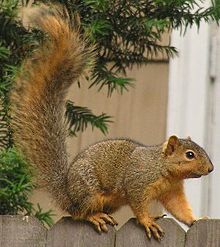squirrel
| squirrel | ||||||||||||
|---|---|---|---|---|---|---|---|---|---|---|---|---|

Gray squirrel ( Sciurus carolinensis ) |
||||||||||||
| Systematics | ||||||||||||
|
||||||||||||
| Scientific name | ||||||||||||
| Sciurus | ||||||||||||
| Linnaeus , 1758 |


The squirrels ( Sciurus ) are a genus of the tree squirrels (Sciurini) within the family of the squirrels (Sciuridae). A striking feature is the raised, bushy tail. The most famous species in Central Europe is the Eurasian squirrel , commonly referred to simply as the squirrel . All squirrels are forest dwellers and feed primarily on seeds and fruits . The vast majority of species are native to the American double continent . Only 3 of the 29 species live in the Old World , they are distributed over Europe, the Middle East, North and East Asia.
distribution
The different types of squirrels live mainly on the American double continent, where they occur in numerous species in North America as well as in Central and South America. Outside America, only three species occur, of which the Eurasian squirrel ( S. vulgaris ) is distributed over almost the entire European and large parts of the Asian continent. The Caucasian squirrel ( S. anomalus ), on the other hand, occurs only in parts of southern Europe, as well as the Caucasus and Western Asia, and the Japanese squirrel ( S. lis ) is restricted to Japan. In Southeast Asia, as in Australia and Africa, no species of squirrel occur naturally.
The gray squirrel ( S. carolinensis ) in particular was relocated to a large extent away from its original distribution area through displacement and deliberate introduction . In Europe it was introduced in Great Britain, Ireland and Italy, whereby it has almost displaced the originally native squirrels, especially in Great Britain. In addition, the species was established in South Africa, where it could only spread in the Cape Town region due to the lack of forest habitats .
Way of life
All types of squirrels are predominantly diurnal. They feed primarily on nuts and other seeds , fruits and other parts of plants and, more rarely, opportunistically on meat-based foods such as insects , eggs and chicks and other small animals. As tree dwellers, they are very good climbers and most species spend most of their time in trees and only occasionally come to the ground to forage. They usually build their nests (Kobel or Kogel) in the form of a spherical structure made of branches and leaves in tree hollows or forks of branches.
The predators of the squirrels are primarily birds of prey and predators such as martens and cats, especially in South America also snakes. Individual specimens of certain species of squirrel can live up to twelve years.
Systematics
The squirrels form their own genus within the squirrels (Sciuridae) and are assigned to the subfamily Sciurinae and the tribe Sciurini. The scientific system goes back to the first description of the squirrel and some other species of squirrels by Carl von Linné in the 10th edition of his Systema naturae , the squirrel itself represents the nomenclature type . In the Systema naturae, Linnaeus described six species of rodents, including the Genus Sciurus . In addition to the Eurasian squirrel ( S. vulgaris ), this also contained the American fox squirrels S. niger and S. cinereus , the European flying squirrel ( S. volans , today Pteromys volans ), the atlas squirrel ( S. getulus , today Atlantoxerus getulus ), the strip -Buck croissants ( S. striatus , today Tamias striatus ) as well as the species Sciurus flavus, which cannot be assigned .
Within the squirrels, there are currently 29 species that can be divided into seven sub-genera according to individual taxonomies. The 2016 Handbook of the Mammals of the World lists 28 species, although the Sciurus meridionalis , which was only described in 2017, is not included. The following types are currently recognized accordingly:
- Subgenus Tenes
- Caucasian red squirrel ( S. anomalus ), Caucasus , Asia Minor , Palestine
- Subgenus Sciurus
- Allen's croissant ( S. alleni ), northeast. Mexico
- Arizona gray squirrel ( S. arizonensis ), Arizona , New Mexico
- Red-bellied squirrel ( S. aureogaster ), southern Mexico , Guatemala
- Gray squirrel ( S. carolinensis ), eastern North America, naturalized in Great Britain , Ireland and Italy
- Collie squirrel ( S. colliaei ), western Mexico
- Deppe's croissant ( S. deppei ), north Central America
- Japanese squirrel ( S. lis ), Japan
- Sciurus meridionalis , southern Italy
- Mexican Fox Squirrel ( S. nayaritensis ), western Mexico
- Fox squirrel ( S. niger ), central and eastern USA , northeast. Mexico
- Peters' squirrel ( S. oculatus ), central Mexico
- Red squirrel ( S. variegatoides ), Central America
- Eurasian red squirrel ( S. vulgaris ), Europe, North Asia
- Yucatan squirrel ( S. yucatanensis ), Yucatán
- Subgenus Hesperosciurus
- Western gray squirrel ( S. griseus ), western North America
- Subgenus Otosciurus
- Aberthörnchen ( S. aberti ; with the subspecies Kaibabhörnchen S. a. Kaibabensis ), southwest. USA, northwest Mexico
- Subgenus Guerlinguetus
- Guyana squirrel ( S. aestuans ), Venezuela, Guyana , Suriname , French Guiana , Brazil
- Yellow-throated squirrel ( S. gilvigularis ), Venezuela, northern Brazil
- Redstart squirrel ( S. granatensis ), Costa Rica , Panama , Colombia , Venezuela , Ecuador , Trinidad
- Bolivian squirrel ( S. ignitus ), western South America
- Colombian red squirrel ( S. pucheranii ), Colombian Andes
- Richmond's Squirrel ( S. richmondi ), Nicaragua
- Sanborn's squirrel ( S. sanborni ), Peru
- Guayaquil squirrel ( S. stramineus ), Peru , Ecuador
- Subgenus Hadrosciurus
- Venezuelan squirrel ( S. flammifer ), Venezuela
- Junin squirrel ( S. pyrrhinus ), Peru
- Subgenus Urosciurus
- North Amazon red squirrel ( S. igniventris ), northern South America
- South Amazon red squirrel ( S. spadiceus ), central South America
The last three sub-genera were sometimes completely separated into a separate genus Guerlinguetus . Within the species there are both monotypical species and those with numerous subspecies.
Word origin
The scientific name Sciurus is made up of the ancient Greek skia 'shadow' and oura 'tail'. The Greek word stems from the belief that was widespread in ancient times that squirrels could shade themselves with their huge tails.
The etymology of squirrels is not completely clear. As Germanic basis is aikurna * accepted. In the last part of the word there is probably the Indo-European root * (w) oiwṛ-, which can also be found in the Celtic, Latin, Baltic, Slavic and Persian names for the squirrel, the ferret, the polecat or the marten. The first syllable is partly traced back to Germanic * aik- 'oak', partly to an Indo-European root * aig- 'to move violently, to swing'. Eich- is thus perhaps, -hörnchen certainly a secondary reinterpretation of word roots that were no longer understood , even if it was found in Old High German times. The seemingly basic word croissant became the name of the whole family in the 19th century .
literature
- Richard W. Thorington Jr. , John L. Koprowski, Michael A. Steele: Squirrels of the World. Johns Hopkins University Press, Baltimore MD 2012, pp. 37 ff., ISBN 978-1-4214-0469-1 .
- Ronald M. Nowak: Walker's Mammals of the World. 2 volumes. 6th edition. Johns Hopkins University Press, Baltimore MD u. a. 1999, ISBN 0-8018-5789-9 .
supporting documents
- ^ Carl von Linné : Systema naturae. 10th edition, 1758; Volume 1, pp. 60, 63-64 ( digitized version ).
- ^ JL Koprowski, EA Goldstein, KR Bennett, C. Pereira Mendes: Genus Sciurus. In: Don E. Wilson, TE Lacher, Jr., Russell A. Mittermeier (Eds.): Handbook of the Mammals of the World: Lagomorphs and Rodents 1. (HMW, Volume 6) Lynx Edicions, Barcelona 2016, ISBN 978- 84-941892-3-4 , pp. 740-755.
- ↑ Lucas A. Wauters, Giovanni Amori, Gaetano Aloise, Spartaco Gippoliti, Paolo Agnelli, Andrea Galimberti, Maurizio Casiraghi, Damiano Preatoni and Adriano Martinoli. 2017. New Endemic Mammal Species for Europe: Sciurus meridionalis (Rodentia, Sciuridae). Hystrix [the Italian Journal of Mammalogy]. doi: 10.4404 / hystrix-28.1-12015
- ^ Henry George Liddell, Henry Stuart Jones, Robert Scott: A Greek – English Lexicon. 9., revised. and exp. Clarendon Press, Oxford 1951.
- ↑ Etymological dictionary of the German language . Arranged by Elmar Seebold. 25th, reviewed and expanded edition. De Gruyter, Berlin / Boston 2011, p. 231; Etymological dictionary of German. 2nd edition, reviewed and supplemented by Wolfgang Pfeifer. Academy, Berlin 1993, p. 264.
